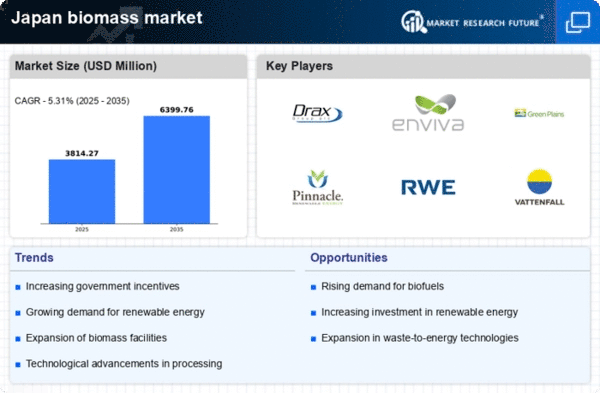The biomass market in Japan is characterized by a dynamic competitive landscape, driven by increasing demand for renewable energy sources and government policies promoting sustainability. Key players such as Drax Group (GB), Enviva Holdings (US), and RWE AG (DE) are actively shaping the market through strategic initiatives. Drax Group (GB) focuses on innovation in biomass technology, aiming to enhance efficiency and reduce emissions, while Enviva Holdings (US) emphasizes regional expansion to secure supply chains and meet growing customer needs. RWE AG (DE) is investing in digital transformation to optimize operations and improve sustainability metrics, collectively influencing the competitive environment by fostering a culture of innovation and responsiveness to market demands.The business tactics employed by these companies include localizing manufacturing and optimizing supply chains to enhance operational efficiency. The market structure appears moderately fragmented, with several players vying for market share. However, the collective influence of major companies is significant, as they leverage their resources and expertise to establish a competitive edge. This fragmentation allows for niche players to emerge, yet the dominance of larger firms shapes overall market dynamics.
In October Drax Group (GB) announced a partnership with a leading Japanese energy firm to develop advanced biomass solutions tailored for the local market. This strategic move is likely to enhance Drax's footprint in Japan, allowing it to leverage local expertise and resources while addressing specific regional energy needs. Such collaborations may facilitate knowledge transfer and innovation, positioning Drax as a key player in the Japanese biomass sector.
In September Enviva Holdings (US) expanded its operations by acquiring a biomass production facility in Japan. This acquisition is strategically important as it not only increases Enviva's production capacity but also strengthens its supply chain resilience. By securing local production capabilities, Enviva can better serve its customers and respond to the growing demand for sustainable biomass solutions in the region.
In August RWE AG (DE) launched a new digital platform aimed at optimizing biomass supply chain management. This initiative is indicative of RWE's commitment to integrating technology into its operations, potentially leading to enhanced efficiency and reduced costs. The platform is expected to provide real-time data analytics, enabling RWE to make informed decisions and improve its competitive positioning in the market.
As of November current competitive trends in the biomass market include a strong emphasis on digitalization, sustainability, and the integration of artificial intelligence (AI) into operations. Strategic alliances are increasingly shaping the landscape, as companies recognize the value of collaboration in achieving sustainability goals. Looking ahead, competitive differentiation is likely to evolve from traditional price-based competition to a focus on innovation, technological advancements, and supply chain reliability. This shift underscores the importance of adaptability and forward-thinking strategies in navigating the complexities of the biomass market.
















